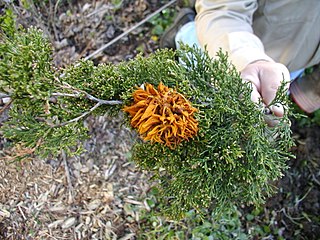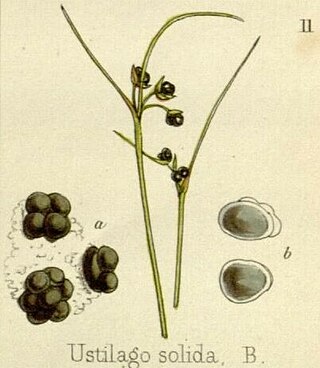
Gymnosporangium is a genus of heteroecious plant-pathogenic fungi which alternately infect members of the family Cupressaceae, primarily species in the genus Juniperus (junipers), and members of the family Rosaceae in the subfamily Amygdaloideae. The common name cedar-apple rusts has been used for these fungi. According to the Dictionary of the Fungi, there was 57 species in the genus. In 2023, Species Fungorum lists up to 74 species.

The Pucciniaceae are a family of rust fungi that cause plant diseases, mainly on cereals such as wheat. The family contains over 4900 species: many of them in the type genus Puccinia.

Phyllachoraceae is a family of sac fungi.
Phaeochorella is a genus of fungi It was formerly placed in the family Phyllachoraceae, before in 2020 placed in the monotypic family of Phaeochorellaceae.

Eudarluca is a genus of fungi in the family Phaeosphaeriaceae. The genus was circumscribed by Italian-born Argentinian botanist and mycologist Carlo Luigi Spegazzini in 1908, with Eudarluca australis assigned as the type species.
Pseudodidymella is a genus of fungi in the class Dothideomycetes. It was later placed in the Melanommataceae family, in the order Pleosporales. As accepted by Wijayawardene et al. 2020;
Phomatospora is a genus of fungi within the class Sordariomycetes, and since 2016, in the family Phomatosporaceae and order Phomatosporales. They are found in terrestrial, freshwater and marine habitats, across the world except Russia and Canada.
The Schizothyriaceae are a family of fungi of uncertain ordinal placement in the class Dothideomycetes. It comprises 10 genera and around 70 species.
The Cephalothecaceae are a family of fungi in the class Sordariomycetes. The family was circumscribed in 1917 by Austrian naturalist Franz Xaver Rudolf von Höhnel. Species in this family are saprobic, often growing on rotten wood or on other fungi. They are known to be distributed in northern temperate regions. The family was placed in a monotypic class CephalothecalesHubka & Réblová in Index Fungorum 424: 1 (2019).
Zygopleurage is a genus of fungi, that was placed within the family Lasiosphaeriaceae, until later analysis placed it within the Neoschizotheciaceae.
Peloronectria is a genus of fungi in the Hypocreales order. The relationship of this taxon to other taxa within the order is unknown, and it has not yet been placed with certainty into any family. Unchanged in 2020.
Pseudomeliola is a genus of fungi in the Hypocreales order. The relationship of this taxon to other taxa within the order is unknown, and it has not yet been placed with certainty into any family. Unchanged in 2020.
Phragmocapnias is a genus of fungi in the family Capnodiaceae.
Phaeochora is a genus of fungi within the family Phaeochoraceae.

Trichoglossum is a genus of fungi in the family Geoglossaceae. They are commonly called hairy earth tongues. The type species is Trichoglossum hirsutum.

Elias Judah Durand was an American mycologist, and botanist. He was one of the foremost American experts on the discomycetes.

Lichenoconium is a genus of fungi belonging to the family Lichenoconiaceae.

Cintractia is a genus of fungi belonging to the family Anthracoideaceae. It was first described by Marie Maxime Cornu in 1883.
Farysia is a genus of fungi belonging to the family Anthracoideaceae.

Stilbella is a genus of fungi in the order Hypocreales. The relationship of this taxon to other taxa within the order is unknown, and it has not yet been placed with certainty into any family. It is sometimes placed in the family Bionectriaceae.









